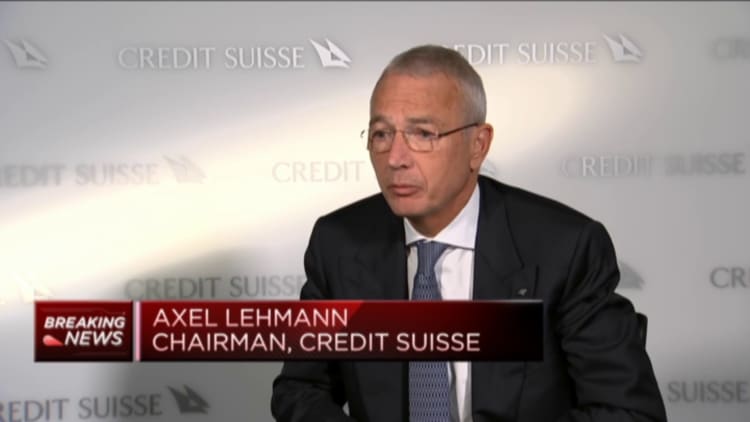Credit Suisse shares slipped on Wednesday after Goldman Sachs downgraded the stock to "sell" following credit rating downgrades from Moody's and S&P.
The embattled Swiss lender's shares were down slightly by early afternoon trade in London, having recouped some of their earlier losses, and remain down more than 42% year-to-date, as new CEO Ulrich Koerner takes the reins following the resignation of Thomas Gottstein last week.
The bank announced a new strategic review after reporting a second-quarter net loss of 1.593 billion Swiss francs ($1.66 billion), well below consensus, as poor investment bank performance and mounting litigation provisions hammered earnings.
Goldman Sachs noted on Tuesday that Credit Suisse has underperformed the rest of the sector by 59% since the start of 2021, due to company-specific events and industry-wide obstacles to revenue.
The Wall Street giant expects this underperformance to continue over the next 12 months as investment bank returns remain suppressed through to 2024, and projected a pause in near-term wealth management performance due to outflows and subdued market performance.
"On capital, while we foresee no near-term shortfall, organic capital generation is below peers and RWA (risk-weighted assets), inflation plus litigation plus restructuring has the potential to further deplete capital to a relatively low buffer vs regulatory minimums," Executive Director Chris Hallam and his team said in Tuesday's note.
Despite the more favorable picture Goldman sees across the European banking space — in which higher interest rates will boost revenue and returns forecasts, reinvestment in new technology will enhance returns, and excess capital can be distributed to shareholders — Credit Suisse is valued roughly in line with the sector at present.
"Our revised 12-month price target implies 5% upside, but in the context of c.60% upside on average across our Banks coverage, this equates to meaningful underperformance: accordingly, we downgrade the stock to Sell from Neutral," Goldman said.
Credit downgrades
Moody's on Monday downgraded Credit Suisse's senior unsecured debt and deposit ratings by one notch and maintained a negative outlook on the bank's credit trajectory.
"The downgrade of CS's ratings reflects the challenges the group is facing in successfully executing on its previously announced repositioning of its investment bank in the more difficult macroeconomic and market environment as well as uncertainty as to the business and financial implications of the group's plans to take further steps to achieve a more stable, capital light and better aligned investment banking business," Moody's said in its update.
The ratings agency also cited "the crystallisation of large financial losses during H1 2022, resulting in stress on the bank's financial profile and potential delays in technology investments, and in the transformation of the business and an expectation of continued weak performance in 2022."

Furthermore, Moody's highlighted evidence of an erosion of Credit Suisse's market share and "franchise impairment" in its investment bank, following deleveraging in its capital-intensive businesses and exit from its prime brokerage business.
The ongoing overhaul of its risk and compliance operations is "lengthy and resource-consuming," while stabilizing the group under new leadership and a fresh senior executive team will take time, Moody's said.
"These factors are partially mitigated by the firm's solid – although decreasing – capitalisation and strong liquidity and funding profiles," it added.
Credit Suisse Chairman Axel Lehmann told CNBC last week that the new strategic review will look to accelerate restructuring efforts.
The review will aim to drastically reduce the group's cost base, strengthen its wealth management, Swiss banking and asset management operations, and transform the investment bank into a capital-light, advisory-led banking business with a greater focus on markets.
However, Moody's cited uncertainty over the bank's "ability to successfully execute" on the "as yet to be defined" restructuring strategy, along with "governance deficiencies and top management instability," in a one-notch downgrade for corporate behavior on Credit Suisse's scorecard.
S&P Global Ratings on Monday revised its outlook on Credit Suisse to negative, citing increasing risks to the stability of the bank's franchise, uncertainty around the reshuffling of top executives, and a "lack of a clear strategy," along with continued weak profitability over the medium term.
"The negative outlook reflects the setbacks Credit Suisse could face in redesigning its strategy, with new management at the helm, in order to transform the bank in an increasingly difficult operating environment," S&P said.

